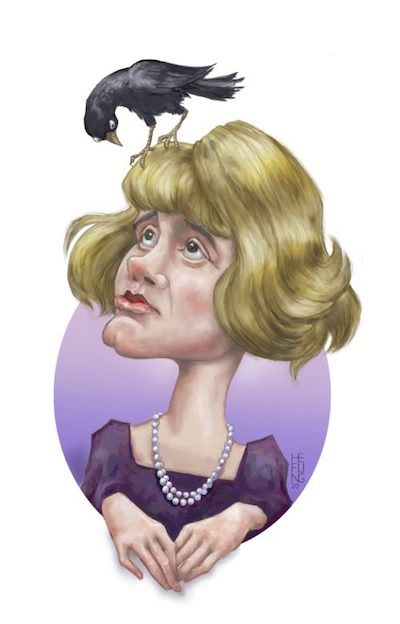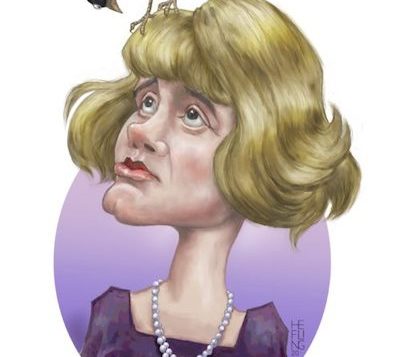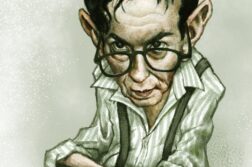“LAST NIGHT I dreamt I went to Manderley again” is the novel’s famous first sentence. Through the first-person narrator’s dream, we see Manderley as a magnificent estate. The narrator awakens, realizing that “Manderley was no more.”
First published in 1938, Daphne du Maurier’s Rebecca has never gone out of print. The reason is not hard to understand. In the words of du Maurier’s son Kits Browning: “It’s the old cliché. It’s a bloody good story.” The book has been called a romance, a mystery, and a Gothic novel. It has been adapted multiple times for stage and screen, but far and away the best-known adaptation is the 1940 Alfred Hitchcock film Rebecca, which won the Oscar for Best Picture that year.
 The novel is written in the first person by a young woman who is never named. She and her husband are staying in a high-class hotel when she writes this recollection of their life together. When the story opens she’s working as companion to a wealthy woman named Mrs. Van Hopper who is vacationing in Monte Carlo. Our narrator is attracted to a wealthy Englishman, Maxim de Winter, a 42-year-old widower whose wife Rebecca died several months before. The narrator is nervous around him, awed by his wealth, his confidence, and his age (old enough to be her father). She believes that the widower is still grieving for his wife, but when Maxim proposes to her, she readily accepts. She follows him back to England and the Cornish estate of Manderley.
The novel is written in the first person by a young woman who is never named. She and her husband are staying in a high-class hotel when she writes this recollection of their life together. When the story opens she’s working as companion to a wealthy woman named Mrs. Van Hopper who is vacationing in Monte Carlo. Our narrator is attracted to a wealthy Englishman, Maxim de Winter, a 42-year-old widower whose wife Rebecca died several months before. The narrator is nervous around him, awed by his wealth, his confidence, and his age (old enough to be her father). She believes that the widower is still grieving for his wife, but when Maxim proposes to her, she readily accepts. She follows him back to England and the Cornish estate of Manderley.
The heroine is immediately uneasy with the main housekeeper of the estate, the middle-aged Mrs. Danvers, “dressed in deep black, whose prominent cheekbones and great, hollow eyes gave her a skull’s face, parchment-white, set on a skeleton’s frame.” However, the narrator finds herself “envying” the housekeeper for “her dignity and her composure.” The narrator often feels that she’s competing with a ghost, as Mrs. Danvers talks admiringly about Rebecca, who indeed is praised repeatedly by other characters for her beauty, intelligence, sophistication, and “spirit.” Rebecca is described as athletic, enjoying sailing and riding horses. By contrast, the narrator is called “placid,” her strong points being kindliness, sincerity, and modesty. The narrator fears Maxim does not really love her but is still in love with his first wife.
Some of the estate’s denizens are nice to the narrator, but tensions with Mrs. Danvers leave the narrator in a state of almost constant anxiety. An odd crisis occurs when the narrator tries to prepare for the annual Manderley costume ball. Mrs. Danvers suggests modeling herself after a beautiful painting that hangs in the house. Hoping to make a great impression, the narrator meticulously copies the painting. When she makes her entrance, Maxim—and the others around him—gape at her in horror. Maxim furiously orders her to change her outfit. The confused narrator realizes she has made a disastrous public faux pas. Then she sees who led her into this blunder: “It was Mrs. Danvers. I shall never forget the expression on her face, loathsome, triumphant. The face of an exulting devil.” The narrator learns that her costume was identical to the one Rebecca wore at the ball prior to her death.
The day following this debacle, there’s a confrontation between the narrator and Mrs. Danvers. Our narrator is surprised that the housekeeper is no longer “triumphant” but “her eyes were red and swollen with crying, even as mine were.” It is clear that Mrs. Danvers still deeply grieves Rebecca’s loss and bitterly resents the narrator for trying to take her place. Mrs. Danvers encourages the narrator to commit suicide by jumping out a nearby window. The almost hypnotic spell the housekeeper weaves is suddenly broken—and our protagonist’s life saved—when rockets are heard going off over the cove. The rockets signal that a ship has run aground. The wreck turns out to be the sailboat that belonged to Rebecca, and her long-dead corpse is on board.
This discovery leads Maxim to reveal the truth to our narrator: he did not love Rebecca but hated her. “Rebecca was incapable of love, of tenderness, of decency,” Maxim says. “She was not even normal.” He continues that shortly after they wed “she told me about herself, told me things I shall never repeat to a living soul.” Maxim informs the narrator that Rebecca had multiple adulterous affairs that she didn’t even try to hide from him, including an affair with her cousin Jack Favell. At first, she was discreet, meeting her paramours in London to avoid gossip. Then she got careless, letting them see her at Manderley.
Maxim recalls how he confronted her about the growing flagrancy of her behavior. She told him she intended to “turn over a new leaf.” She had to, since she was pregnant. Rebecca dangled before Maxim the prospect of “my son lying in his pram under the chestnut tree, playing leap-frog on the lawn, catching butterflies in the Happy Valley” and inheriting Manderley on Maxim’s death. Infuriated at the prospect of another man’s child inheriting his fortune, Maxim took out a gun and shot Rebecca to death. Then he stowed the corpse in her sailboat and sank it.
The narrator suffers not the least bit of horror or moral outrage at learning that her husband is a murderer. Instead, she is relieved that Maxim did not love Rebecca. This leads to a fresh sense of confidence. She feels her marriage is secure and her husband really loves her. However, these good feelings are accompanied by fear for Maxim that his crime could be discovered. And the plot moves on from there.
Before exploring gender and sexuality in the novel, let me turn briefly to these topics as they interwove with the author’s life. In an essay on Rebecca for The Guardian, Olivia Laing noted that du Maurer recalled herself as having been a “half-breed” in her childhood, describing herself as a girl “with a boy’s mind and a boy’s heart.” As a child, her parents allowed Daphne to dress in boys’ clothes, but when she reached adulthood, her “boy” tendencies were “locked in a box.” Her sense that she had the mind and heart of a boy is echoed in the novel when Mrs. Danvers comments that Rebecca’s adventurous spirit meant that she “should have been born a boy.”
Fast forward to a decade or more after she had published Rebecca, when du Maurier—now married to a man and a mother—experienced a powerful, unrequited attraction to Ellen Doubleday, the wife of du Maurier’s American publisher. Later in her life, she would have lesbian relations with actress Gertrude Lawrence.
Critics have long recognized a lesbian subtext in Rebecca. Of course, given the time period in which it was written, subtlety and subterfuge were required. Although the novel is frank about Rebecca’s heterosexual “sins,” it could not in the 1930s be explicit about what was still an unmentionable topic. Rebecca’s bisexuality could be hinted at—for example, when Maxim calls Rebecca “not even normal” and says she told him things he “will not repeat to another living soul”—but that is all.
The relationship between Mrs. Danvers and the late Rebecca is rich with sensual intimacy. Writes critic Drew Gregory (in Autostraddle.com, 7/29/19): “The person [Rebecca] confided in was Danvers. The person she stayed up late at night with was Danvers. The person who undressed her and bathed her was Danvers.” Discussing the Hitchcock film, Gregory asserts: “The most famous scene in the film, the gayest scene in the film, finds Danvers and Second in Rebecca’s old room.” There Danvers leads the narrator on a tour of the first Mrs. de Winter’s clothing. Mrs. Danvers puts a fur against her own face and then against the face of the narrator. Then she shows the latter Rebecca’s undergarments, emphasizing what Mrs. Danvers describes as the “delicacy” of the lingerie: “You can see my hand right through it.”
I would like to point to another subtext in addition to Mrs. Danvers’ obsession with Rebecca. What has been overlooked are the narrator’s feelings toward Mrs. Danvers and the possibility that she is now obsessed with the woman who knew and loved Rebecca. Following her betrayal at the ball, on top of all the other negative associations, why hasn’t the narrator simply fired her employee by now? Indeed why does she crave the approval of this hostile underling? Keeping Mrs. Danvers on only makes sense if we conclude that the narrator wants her to stick around. She desperately wants to turn Mrs. Danvers’ dislike and resentment into affection. She wants Mrs. Danvers to have the same admiration for her walk, speech, eyes, smile, and hair that she had for Rebecca.
Denise Noe’s work has appeared inThe Humanist, The Literary Hatchet, and other periodicals.





